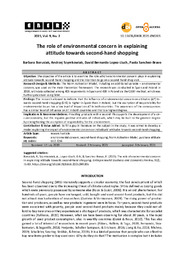Por favor, use este identificador para citar o enlazar este ítem:
https://hdl.handle.net/11000/36521Registro completo de metadatos
| Campo DC | Valor | Lengua/Idioma |
|---|---|---|
| dc.contributor.author | Borusiak, Barbara | - |
| dc.contributor.author | Szymkowiak, Andrzej | - |
| dc.contributor.author | López Lluch, David | - |
| dc.contributor.author | Sánchez-Bravo, Paola | - |
| dc.contributor.other | Departamentos de la UMH::Economía Agroambiental,Ing. Cartográfica y Expresión Gráfica en la Ingeniería | es_ES |
| dc.date.accessioned | 2025-04-16T08:31:49Z | - |
| dc.date.available | 2025-04-16T08:31:49Z | - |
| dc.date.created | 2021-02-03 | - |
| dc.identifier.citation | Entrepreneurial Business and Economics Review (EBER) 2021, Vol. 9, No. 2 | es_ES |
| dc.identifier.issn | 2353-883X | - |
| dc.identifier.issn | 2353-8821 | - |
| dc.identifier.uri | https://hdl.handle.net/11000/36521 | - |
| dc.description.abstract | Objective: The objective of the article is to analyse the role which environmental concern plays in explaining attitudes towards second-hand shopping and the intention to go on a second-hand shop visit. Research Design & Methods: The Norm Activation Model; including an additional variable – environmental concern was used as the main theoretical framework. The research was conducted in Spain and Poland in 2019, with data collected among 403 respondents in Spain and 438 in Poland via the CAWI method, which was further processed using SEM. Findings: The research allowed to indicate that the influence of environmental concern on attitudes (AT) towards second-hand shopping (SHS) is higher in Spain than in Poland, but the ascription of responsibility for environmental issues has a low level of impact on AT in both countries. The awareness of the consequences has a similar level of influence on AT in both countries and this explains the greatest AT. Implications & Recommendations: Providing products with a second life supports the development of a circular economy, but this requires positive attitudes of individuals, which may be built to the greatest degree by strengthening the ascription of responsibility for the environment. Contribution & Value Added: To fill a gap in literature on the subject in the study, it was aimed to develop a model explaining the impact of environmental concern on individuals’ attitudes towards second-hand shopping | es_ES |
| dc.format | application/pdf | es_ES |
| dc.format.extent | 14 | es_ES |
| dc.language.iso | eng | es_ES |
| dc.publisher | Uniwersytet Ekonomiczny w Krakowie - Centre for Strategic and International Entrepreneurship | es_ES |
| dc.rights | info:eu-repo/semantics/openAccess | es_ES |
| dc.rights | Attribution-NonCommercial-NoDerivatives 4.0 Internacional | * |
| dc.rights.uri | http://creativecommons.org/licenses/by-nc-nd/4.0/ | * |
| dc.subject | Environmental concern | es_ES |
| dc.subject | Second-hand shopping | es_ES |
| dc.subject | Norm Activation Model | es_ES |
| dc.subject | Purchase attitude | es_ES |
| dc.title | The role of environmental concern in explaining attitude towards second-hand shopping | es_ES |
| dc.type | info:eu-repo/semantics/article | es_ES |
| dc.relation.publisherversion | https://doi.org/10.15678/EBER.2021.090205 | es_ES |

Ver/Abrir:
eber,+EBER-09-02-05-pp071--1046-Borusiak,Szymkowiak,Lopez-Lluch,Sanchez-Bravo.pdf
366,44 kB
Adobe PDF
Compartir:
 La licencia se describe como: Atribución-NonComercial-NoDerivada 4.0 Internacional.
La licencia se describe como: Atribución-NonComercial-NoDerivada 4.0 Internacional.
.png)